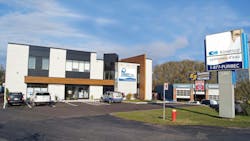Transatlantic Transactions
About the author: Adilla Menayang is associate editor for WQP. Menayang can be reached at [email protected] or 847.391.1057.
The company for which Parisian Jerome Papaya works, Puribec, started as a Kinetico water softener dealer primarily serving residential customers in the mid-sized Quebecois city of Rimouski. Today, it is the province’s official provider of Kinetico products, and has expanded its business to serve small commercial, municipal and industrial businesses, with 20 dealers in Quebec and some operations in West Africa. As the company has grown and evolved, so has Papaya’s career in the industry.
It All Started in Paris
“When I started [with Puribec] in 1998, it was to build the laboratory section for [the company’s] analysis,” Papaya said. He started the job that brought him across the Atlantic five years after he finished his undergraduate degree at Paris’ National School of Chemistry, Physics and Biology with a degree in microbiology.
During his studies, Papaya discovered his interest in water. As soon as he received his bachelor’s degree, he enrolled in a two-year French higher education diploma program to attain a B.T.S. Métiers de l’eau, which certifies that he has completed the country’s highest education attainable to be a water technician.
“I learned a lot of chemistry, microbiology, automation, water process engineering [and] hydraulics,” Papaya said about the program. But he could not jump straight into the field of his calling after getting his diploma. “I had to do [France’s mandatory army service] for 10 months after graduation,” he said. Once he completed his service, he was hired by Puribec and flew to Canada to begin his new life in a new country.
First Came Science, Then Came Sales
Shortly after Papaya joined the Puribec staff, CEO Stephane Giasson asked to work with him on commercial projects. “I had no experience as a sales rep,” Papaya said. “I learned it all from Stephane.”
As is the case with many small companies, Papaya began to multitask across fields. As the company grew, new departments were established, and Papaya started to spread himself thin. “When Puribec started its [research and development] department, I also helped with ideas, analysis and regulatory research,” he said. In 2008, Papaya was nominated by his colleagues to manage the company’s commercial division, allowing him to focus more on sales.
Last year, Papaya’s responsibilities increased, and he became head of the networks and technology development division. This growth required the company to branch out and create a new spinoff, Puribec Technologies.
“We did some important applications,” Papaya said about the new spinoff’s portfolio. The division was in charge of multimillion-dollar water quality system installations for IBM’s laboratory in Sherbrooke, Quebec, and the McGill University Health Centre in Montreal.
In addition, Puribec Technologies worked on water treatment facilities for mining projects in Northern Canada, as well as in the West African countries of Senegal and Burkina Faso.
Building Expertise Through Community
Initially, Papaya’s French water technician certification did not translate well into the North American water quality industry. “After one year of working there, Stephane asked me to get the CWS-I certification from the Water Quality Assn. (WQA),” he said. Equipped with his expertise in water quality from his French diploma, Papaya remembers that passing most of the tests’ components was easy, “but I failed in the technical installation part.” According to Papaya, the CWS-I was the hardest level of certification to achieve. As he continued to take the tests, it only got easier, he said. Today he is certified as a CWS-VI.
Being a member of WQA is important to Papaya. “We need this kind of association, as water professionals, to speak in one voice and to help the government improve the water business,” he said. “From my experience, getting the CWS-VI was what made the government’s environmental department reach out to me to participate in a study.”
This study was commissioned by Quebec’s ministries of health and the environment, which wanted to understand the current landscape of residential water treatment in the province. They found that there were many self-proclaimed “specialists” who were selling the wrong products to customers, causing the water industry to lose credibility. “So [the ministries] asked us to build a French version of the WQA CWS certification, with more emphasis on Quebec regulations, disinfection and microbiology,” Papaya said.
What Papaya likes best about the industry, howeve — and what makes him optimistic about its future — is giving back. He participated in elementary school awareness programs for the nonprofit organizations One Drop and Water For People, which raise funds to increase access to safe drinking water worldwide. “It was fantastic!” Papaya said. “Success comes when the water quality industry is always trying to build, design and use technologies that will be green and economical.”
Download: Here
